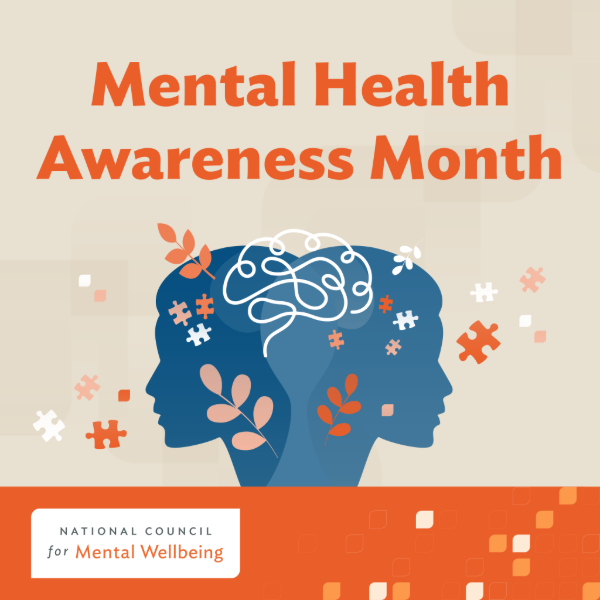One of the most powerful ways to support Mental Health Awareness Month is by leading by example — prioritize your own mental wellbeing with our free self-care checklist!
Mental Health Awareness Month 2025
What is Mental Health Awareness Month?

May is Mental Health Awareness Month, an annual observance founded by Mental Health America in 1949 to highlight the importance of mental wellbeing, educate the public, reduce stigma and promote support for those affected by mental health conditions. Each year, individuals and organizations come together to raise awareness and advocate for better mental health care and resources.
Why Do We Support Mental Health Awareness Month?
Mental health awareness plays a crucial role in reducing stigma, encouraging early intervention and fostering empathy and understanding. By normalizing conversations around mental health, it nurtures a more compassionate society where individuals feel empowered to seek help, leading to improved mental wellbeing. Key objectives of Mental Health Awareness Month include:
- Educating the public about mental health conditions and their impact.
- Reducing stigma by encouraging open conversations and fostering acceptance.
- Highlighting the importance of early intervention and access to treatment.
- Sharing available mental health resources, including support groups and crisis services.
- Building solidarity and reducing isolation for those facing mental health challenges.
- Advocating for improved mental health policies, increased funding and better access to care.
- Promoting mental wellbeing and self-care practices for overall health.
What Are Some Key Facts About Mental Health?

Despite progress in mental health initiatives, more than 30 million people in the U.S. still lack access to comprehensive, high-quality care. These statistics highlight the ongoing need for Mental Health Awareness Month and the importance of bringing attention to this disparity:
- 1 in 5 U.S. adults experience mental illness each year.
- 1 in 20 U.S. adults experience serious mental illness each year.
- 1 in 6 U.S. youth have a mental health condition, but only half receive treatment.
- 50% of all lifetime mental illness begins by age 14, and 75% by age 24.
- In 2023, 20% of all high school students seriously considered suicide.
How Can I Support Mental Health Awareness?
Take action this Mental Health Awareness Month by focusing on what you can control — your own wellbeing. We’ve put together a free self-care checklist with simple, practical ways to support your mental health. You can download it below.
Looking for more ways to make an impact? You don’t have to work in behavioral health care to help yourself and others thrive. Here are three things you can do this month to move mental health forward:
- Stay informed with our free webinars. We host expert-led sessions each month on mental health topics and trends — bookmark our events page and check back regularly for upcoming events.
- Get trained in Mental Health First Aid (MHFA). You can be the difference through MHFA, a course that teaches how to identify, understand and respond to signs of mental illnesses and substance use challenges. Already trained? Learn how to become a MHFA Instructor!
- Raise your voice. Help us advocate to expand access to mental health and substance use care and bring attention to the importance of mental wellbeing.
How Can I Help Protect Access to Care?
Mental Health Awareness Month comes at a really important moment this year. Right now, the House Energy & Commerce Committee — in charge of Medicaid — is getting ready to draft legislation that is expected to include major budget cuts. That likely means cuts to Medicaid, which is the biggest funder of mental health and substance use treatment in the U.S. On top of that, Congress is starting its yearly budget process, which decides funding for programs like Certified Community Behavioral Health Clinics (CCBHC) expansion grants, Mental Health Awareness Training grants, and more. Want to get involved? Check out these resources to make your voice heard:
- Sign up for our Advocacy Alerts to stay informed of opportunities.
- Send a letter to your Representatives and Senators.
- Make a phone call to lawmakers’ offices.
- Share your story about access to care through Medicaid.
- Read our fact sheet on proposed Medicaid changes.
- Learn more about Medicaid specific to your state.
- Explore our resource hub for public polling and topic-specific Medicaid points.
- Download our Advocacy Handbook for tools and tips.
- Visit the CCBHC Success Center to access resources.
- Learn more about the CCBHC model and its impact.
How Can I Help Raise Awareness in My Community?
You can make an impact this Mental Health Awareness Month by spreading the word. Share these messages on social media to help promote mental wellbeing:
May is #MentalHealthAwarenessMonth! Let’s break the stigma and start open conversations about mental health. #EndTheStigma #MentalHealthMatters
Mental health is just as important as physical health. This month, let’s educate, advocate and support each other! #MentalHealthAwareness #YouAreNotAlone
It’s OK to not be OK. May is a reminder to check in on your mental health and ask for help if you need it. Let’s lift each other up. #MentalHealthMatters #YouMatter
This #MentalHealthAwarenessMonth, let’s raise awareness, reduce stigma and ensure everyone has the resources they need to thrive. It starts with us! #BreakTheStigma #SupportMentalHealth
Together, let’s advocate for better resources, policies and support for everyone. It’s time to take action for a healthier future. #MentalHealthAwareness #AdvocateForChange
How Can I Stay Informed of Mental Health News?
By staying informed, getting involved and spreading awareness year-round, you can make a difference in your own mental health and the lives of others. Here are a few ways to do that:
Take advantage of our newsletters, resources and learning opportunities:
- Sign up for our newsletters to stay updated on the latest news and trends.
- Join our Advocacy Alerts to take action when it matters most.
- Explore our National Council blog for best practices and inspiring stories.
- Raise awareness of the 988 Suicide & Crisis Lifeline in your community and beyond.
- Follow us on Facebook, Instagram, LinkedIn and YouTube.
Explore these Mental Health First Aid resources available to you:
- Want to get trained in Mental Health First Aid? Find a course near you!
- Already a First Aider? Learn how you can become an Instructor!
- Bookmark our Mental Health First Aid blog for wellbeing insights.
- Follow Mental Health First Aid on Facebook, X and Instagram.
From all of us here at the National Council for Mental Wellbeing, thank you for joining us in recognizing Mental Health Awareness Month. Together, we will make a meaningful impact!
